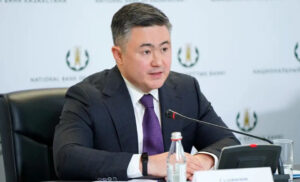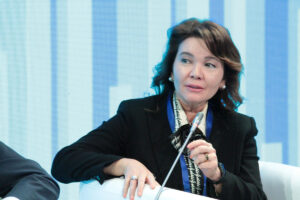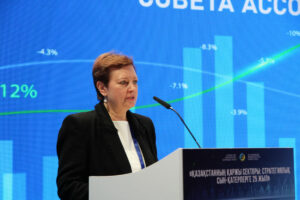ASTANA—Almaty hosted a forum dubbed Financial Sector of Kazakhstan: 25 Years of Strategic Challenges on May 21, dedicated to the 25th anniversary of the Association of Financiers of Kazakhstan, reports the association’s press service.

The Association of Financiers of Kazakhstan consists of 128 members. Photo credit: afk.kz
The association was founded at the First Congress of Financiers in May 1999 to unite financial market participants and ensure the market’s dynamic development. It comprises 128 members, including representatives of Kazakh banks, insurance companies, securities market participants, educational institutions, and other financial market entities. The total assets of financial organizations have reached 55 trillion tenge (US$124.5 billion).
“We are sincerely glad that many respected colleagues were able to join our professional discussion and believe that such an honest and open discussion of problems will allow us to get closer to solving them, find common ground between the interests of the state and market participants, see new prospects and opportunities for growth and development financial sector,” said Elena Bakhmutova, the association’s chairwoman, in her welcoming address.

Chairman of the National Bank of Kazakhstan Timur Suleimenov. Photo credit: The press service of the National Bank
The forum addressed some of the most pressing issues, including liberalization and modernization of the economy and the banking sector, prospects for the development of corporate and retail lending, and insurance.
Chairman of the National Bank of Kazakhstan Timur Suleimenov spoke about the role of the financial sector in ensuring the country’s economic development.
He reiterated the targets the country’s leadership set to ensure annual growth in lending to the real sector by at least 20%. In March 2023, President Kassym-Jomart Tokayev signed a decree on measures to expand lending to the real sector of the economy and reduce the debt burden of the population.
“Achieving the goal will ensure the economic development of the country and create a favorable business environment. To do this, the financial sector must effectively fulfill its primary role of redistributing capital. It is important to continue the digitalization of banking services and introduce innovative technologies in lending. We expect banks to focus on their core activities and actively support businesses by providing flexible terms for borrowers,” said Suleimenov, as quoted by Kazinform news agency.
He stressed the crucial role of establishing a solid stock market as an efficient channel to redistribute financial resources, developing the non-banking sector and alternative sources of financing the economy.
“The support will be provided to the fintech sector and young startup projects. For its part, the state is creating the necessary conditions for the development of growth in lending to the real sector,” he added.
Excessive government regulation
The forum participants agree government regulation of the banking sector is redundant. According to financiers, the state’s excessive interference in the operational activities of financial organizations and disproportionate tax burdens on the industry could adversely affect Kazakhstan’s investment attractiveness for foreign capital.

Umut Shayakhmetova has headed Halyk Bank for 15 years. Photo credit: afk.kz
According to Halyk Bank Chairwoman Umut Shayakhmetova, the current rules hinder the sector’s development.
On May 10, Kazakh President Kassym-Jomart Tokayev signed the decree on measures to liberalize the economy. The decree aims to ensure freedom of entrepreneurship by developing competition, reducing state stakes in the economy, and decreasing business costs.
Shayakhmetova commended the initiative but urged to treat the banking sector as a business.
“We always say that regulation should be counter-cyclical. What is happening today is more pro-cyclical,” said Shayakhmetova, who leads the country’s biggest second-tier bank with assets worth 15.9 trillion tenge (US$35.9 billion)
Shayakhmetova criticizes the current trend of tightening regulatory measures despite the aim of boosting economic growth and lending. While there is a clear goal to increase lending, drive economic growth, and double the GDP, the simultaneous tightening of regulations makes these goals harder to achieve.
“The tightening trend comes not only from regulators but also from the government in terms of taxation, antimonopoly regulation, and competition from the quasi-public sector,” said Shayakhmetova.
Member of the board of directors and independent director of the Development Bank of Kazakhstan Anvar Saidenov echoed these remarks. According to him, liberalizing measures in which entrepreneurs and businesses operate in Kazakhstan should apply to banks, including from a regulatory point of view.
“But banks are a specific type of business, and therefore, it is regulated in a special way. This is the only type of business that operates with other people’s money. Hence, the requirements are for the capitalization of banks and shareholders. There should be regulation, but it is forgotten that bank shareholders are the same business people – they expect returns, income, and dividends on their investments,” he said.
Prospects from foreign banks entering Kazakhstan

Bakhmutova addresses the forum. Photo credit: afk.kz
The forum also explored the prospects and challenges of foreign banks entering the country. In his state-of-the-nation address in September 2023, President Kassym-Jomart Tokayev tasked the government to attract foreign banks to Kazakhstan.
However, some bankers are cautious about that. Shayakhmetova said foreign banks are not a “panacea for solving all problems.”
“Today, out of 21 banks in Kazakhstan, 12 have foreign capital. This is more than 50% of the total number of banks. However, 90% of the volume of assets, lending and deposits accounts for nine banks with Kazakh participation. That is, around 10% of all
assets are accounted for by foreign banks, which account for more than 50% in number,” said Shayakhmetova.
Elena Bakhmutova welcomed the emergence of new banks but stressed the need for unified regulatory norms for foreign branches and local banks.
“We are for unified standard supervision, for predictable regulation,” she said.
She does not see any barriers for foreign banks to come to Kazakhstan. “The external environment is also important. To come here, you need predictable geopolitical conditions. With this, we are all fine,” she said, noting that financial institutions might consider not only Kazakhstan but a broader region of Central Asia.
